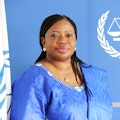The importance of the relationship between International Criminal Court (“ICC” or “the Court”) and the United Nations (“UN”) is reflected in article 2 of the Rome Statute, the founding treaty of the ICC, which requires that the Court be “brought into relationship with the United Nations through an agreement […].” The Court and the UN concluded the Negotiated Relationship Agreement on 4 October 2004. This agreement has facilitated the various ways in which the UN and the ICC cooperate with full respect for each other’s respective mandates.
The Court’s relationship with the UN Security Council (“UNSC” or “Council”) raises many questions and involves intricate issues. The topic, therefore, requires particular attention.
As we know, while the UNSC has been given the primary responsibility to maintain international peace and security under the UN Charter, the mandate of the Office of the Prosecutor of the ICC (“OTP” or “Office”) is to ensure accountability for the most serious crimes of concern to the international community in accordance with the Rome Statute.
I firmly believe that the fight against impunity for Rome Statute crimes can make a positive contribution towards the goal of achieving sustainable peace and security. The Preamble of the Rome Statute indeed recognises that atrocity crimes constitute a threat to “the peace, security and well-being of the world.”
It also bears recalling that the UNSC was instrumental in ushering in what the UN Secretary-General has called “the age of accountability.” It was in fact the Council which revived the notion of international criminal justice in the early 1990s by establishing the UN ad hoc tribunals for the former Yugoslavia and Rwanda following a long period of silence and inaction since the post-World War 2 Nuremberg and Tokyo trials. These important developments ultimately paved the way for the realisation of the ICC.
When states negotiated and adopted the Rome Statute, they specifically ensured a role for the UNSC vis-à-vis the Court. Of particular note is the authority granted by article 13(b) of the Rome Statute to the UNSC to refer situations where atrocity crimes are being committed to the Prosecutor of the Court, acting under Chapter VII of the UN Charter.
To preserve its prosecutorial independence – so vital to the credibility of the Court – my Office is not bound to automatically accept referrals by the UNSC; in all instances, it will do so independently and only on its own accord when it is fully satisfied that the necessary legal requirements of the Rome Statute are met.
Where referrals by the UNSC have met the requisite legal tests and therefore been accepted by the Court, practice has demonstrated that necessary follow-up and sustained support from the Council are crucial.
Several recent developments are promising in that they point to a growing recognition by states, civil society and the Council itself that the status quo relationship between the Court and the UNSC requires further consideration. These include, amongst others, the UNSC’s opendebate on “Peace and justice, with a special focus on the role of the ICC” - the first of its kind - held in October 2012 on the initiative of Guatemala. The Court’s 2013 Report on the status of ongoing cooperation between the ICC and the UN, including in the field, as well as its recent 2015 Report of activities to the UN, identify possible measures that can give impetus for further discussions on the independent yet linked mandates of the Council and the Court.
Below, I have listed a number of issues and suggestions which need to be addressed.
Increasing dialogue and interaction between the Court and the Council: My Office’s briefings on UNSC referrals provide of course an important opportunity to update the Council on the latest developments with respect to the situations referred to the Court and to raise issues of concern. To date, there have been 21 such briefings in relation to the situation in Darfur, and ten briefings on the situation in Libya.
My Office would welcome regular exchanges with the Council, independent of the specific situations referred by the UNSC. These briefings could address inter-institutional matters on how to strengthen the working methods of the Council in relation to the ICC – building on a similar initiative helpfully organised in October 2014 under the Presidency of Argentina – or thematic topics such as sexual and gender-based crimes, and children in armed conflict. The proposed increased interaction would be mutually beneficial.
Public and diplomatic support from the Council for the Court: Public and diplomatic support remains a priority for the Court and for galvanising arrest efforts. The Council can greatly contribute to these efforts through its statements recalling the need to observe applicable norms of international law and stressing the importance of accountability for those most responsible for committing Rome Statute crimes. The Council could issue statements recalling its resolutions referring a situation to the ICC and the underlying legal obligations of states to cooperate.
Need for concrete follow-up in response to official communications and findings of non-compliance: The lack of concrete action and response from the Council to official ICC communications relating to matters of state non-compliance also needs to be looked at and rectified. To date, the Court’s Judges have addressed at least eleven such communications to the Council in relation to the Darfur and Libya situations. These communications are yet to receive a response.
Similarly, the Council’s inaction regarding findings of non-compliance issued by the Court referred to the UNSC undermines the credibility of both the Council and the ICC. It is imperative for the Council to recognise its crucial role vis-à-vis those states that have been found to be in non-compliance by the Court, and to fully assume its responsibilities to advance the objectives of the Rome Statute.
Arrests: The Council’s active role in support of situations it has referred to the Court is indispensable. The Council must regularly call on states to uphold their obligation to arrest and surrender suspects wanted by the ICC. I welcome the Office of Legal Affairs’ updated UN Guidelines of March 2013 on contacts with persons subject to ICC arrest warrants or summonses. These guidelines can serve as a basis for a more comprehensive and consistent approach by States Parties and the Council.
Support for UN funding: Under article 115(b) of the Rome Statute, funds of the Court may be provided by the UN, subject to the approval of the General Assembly, in particular in relation to the expenses incurred due to referrals by the Council. As I have stated in different fora, including before the Council itself, it is incumbent upon the UNSC to support and help devise innovative ways of providing much needed resources for my Office’s investigative activities in relation to situations referred to it by the Council.
Need for a focal point or permanent working group: As I have argued before the Council, a focal point – or permanent mechanism – for interaction between the Council and the ICC is a low-hanging fruit which can be of great practical assistance and yield many benefits. A focal point could, for instance, take the lead in coordinating UN, ICC, Assembly of States Parties and individual State efforts to proactively track and document the whereabouts, activities and travel agenda of accused persons wanted by the ICC. The focal point could also survey and monitor obligations and responses of states vis-à-vis the arrest of these individuals; such detailed information could help to better inform the Council discussions about how to promote follow-up. A designated focal point for interaction between the Council and the ICC could equally help document specific problems and progress achieved in securing bilateral cooperation. In short, the proposed focal point would ensure continuity and a more systematic follow-up to the Council’s resolutions referring situations to my Office.
The interplay between the Court and the Council is entrenched in the founding treaty of the ICC, and hence, is here to stay. It is reasonable to expect that with time and increased inter-institutional interaction, the burgeoning relations between these two important institutions will ripen and mature.
However, in order to reach that stage, the working methods of the Council vis-à-vis the ICC must be further cultivated. States Parties in the Council, as well as other Council members, will have to be at the forefront of such efforts. My Office stands ready to assist as a supportive partner in this joint undertaking.
Ending impunity for the world’s most destabilising and gravest crimes is not the prerogative of one single institution. It is a collective responsibility with humanity as a whole as its beneficiary.
The UN Security Council’s tangible, consistent and principled support for the Court will be an important factor for the maintenance of international peace and security and the cause of international criminal justice in this new century. Indeed, the former is in many ways contingent on the latter.




